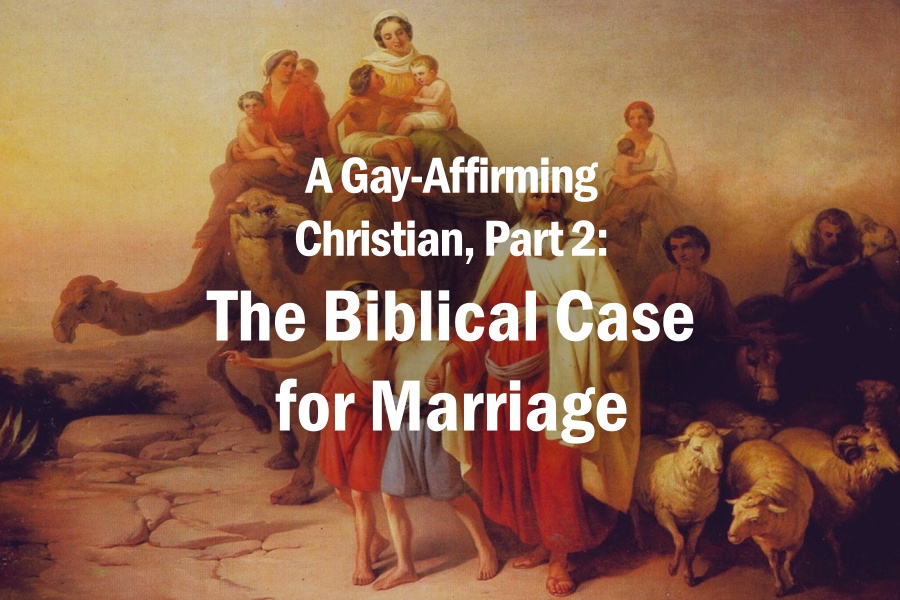This is the second post in a series arguing for the legitimacy of LGBTQ relationships from a Christian perspective. The previous post lays the foundation for having this conversation. If you have not read it yet, please do so before reading this one.
In the second chapter of Genesis, God observes the first problem in his creation, “It is not good for the man to be alone;” and he provides a solution, “I shall make a partner suited to him” (Genesis 2:18, REB).
The blessings of such a union are extolled throughout the scriptures. For example, a well-known proverb advises, “To find a wife is to find happiness, a favor granted by the LORD” (Proverbs 18:22, NABRE). And the whole Song of Songs is devoted to romantic love.
I want to be careful not to devalue singleness for those who are not seeking a relationship. Being single can be a wonderful gift of a different sort. But it’s not for everyone. Most of us are hardwired to crave companionship with a partner.
In fact, right after Paul praises the gift of singleness, he says that “if they do not have self-control, they should marry, for it is better to marry than to burn with desire” (1 Corinthians 7:9, HCSB).
So while some may choose a life of singleness, everyone should be allowed to pursue marriage if that is what they desire. We have no right to force celibacy on any who do not want it.
But what exactly defines a marriage? Does a same-sex union qualify?
We hear a lot these days about a concept known as a “biblical marriage.” Is this the model we should be following?
According to the Bible, the formula for marriage is one man plus one wife… or at least that’s one option (Genesis 2:24–25).
But then again, it could also be one man plus one wife plus a slave (Genesis 16). Or one man plus two wives plus two slaves (Genesis 29–30). Or, in a more extreme case, one man plus seven hundred wives plus three hundred slaves (1 Kings 11:3)!
And take note of the fact that the man in this last example is the same guy whose marital advice fills Proverbs and the Song of Songs (at least according to traditional authorship claims).
Lest we be tempted to think that the Old Testament simply records examples of such marriages without endorsing them, let’s not forget that in certain situations, taking multiples wives was a biblical command (Deuteronomy 25:5).
Additionally, one law specifies, “If a man takes a second wife, he must continue to give his first wife the same amount of food and clothing and the same rights that she had before” (Exodus 21:10, GNB). Well, at least she won’t starve.
Those last instructions were given in the context of explaining how to sell your daughter as a slave (Exodus 21:7–9)—because women were considered the property of either their father or their husband. Speaking of slaves, it’s also well within the biblical view of marriage to take foreign women captive and force them to become your wives (Deuteronomy 21:10–14).
What are we to make of all this? Do you still think a “biblical marriage” is the way to go? I’d suggest the following points, based on what we’ve looked at so far:
- Marriage is God’s solution to being alone. Everyone is entitled to pursue such a relationship.
- Marriages come in all shapes and sizes. The Bible prescribes no single model as the ideal.
- Many of the Bible’s allowances regarding marriage are abhorrent. They must be rejected.
- We cannot give equal weight to every passage of the Bible to determine what a Christian marriage should look like.
Where does that leave us? Do we Christians have any standards we must follow within the realm of marriage?
Yes! The Christian marriage (as with every area of life) falls under the domain of Jesus’ law of love. And it is to this law of love that we will turn in the next post.
Posts in the Gay-Affirming Christian series:
- “Entering the Conversation”
- “The Biblical Case for Marriage”
- “It All Comes Down to Love”
- “Confronting the Clobber Passages”
See also, “It’s Time to Speak Out as a Gay-Affirming Christian.”

















